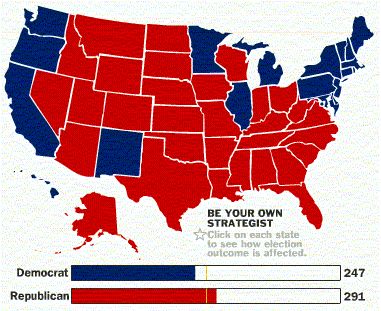Right now, major-party elders should be setting up prediction markets for 2008 so that they can use the early results to dissuade supporters of weak general-election candidates in time to prevent said candidates from attaining nomination.While I think Jason is on to a great idea, I have to disagree that overseas prediction markets are "too thinly traded to be accurate". These markets currently do exist and are being actively traded. (Tradesports.com currently has markets for the Republican Presidential Nominee, Democratic Presidential Nominee, and Presidential Winner for 2008.) I believe there are more than enough Americans (and foreigners with deep insight into American politics) to give accuracy to the markets as they currently exist. If any discernable arbitrage opportunities emerged in these markets, there are enough savvy investors out there who realize these markets are legal for Americans to keep them producing useful and accurate information. These markets produce accurate data, regardless of which national boundaries they reside within.
However, if these markets are based overseas, they may be too thinly traded to be accurate. The markets would certainly have more money on the line, and thus be more far more efficient or accurate, if the U.S. government would make it clear that the participation of American traders in these markets is legal. For seriously, who but an American is going to stake a sawbuck on the candidacies of George Allen, Mark Warner, or others who are unknown on the international stage?"
To back up my point, I will illustrate with a personal example from the 2004 Presidential Election. Markets on Tradesports.com were around at that time and I had just been learning about the power of prediction markets. Using data from Tradesports, I made a prediction for the final election results in an e-mail I sent out to many friends and family members on October 15th, 2004. Here were my predictions:

Keep in mind, this was using no analysis other than data taken directly from Tradesports. Here's what the final outcome of the November election looked like:

The only two states Tradesports got wrong were New Mexico (predicted going to Kerry with 5 electoral votes) and Wisconsin (predicted going to Bush with 10 electoral votes). The final discrepancy of actual vs. prediction -- within 5 electoral votes! Out of 50 states, 48 were predicted accurately. Not bad for an overseas election market!
For more info on prediction markets, see Robin Hanson's website (he's an econ professor at GMU), this New York Times article, and a great collection of links here. I would also strongly recommend James Surowiecki's excellent book, "The Wisdom of Crowds".
1 comment:
Two points:
* A very large share of traders at Tradesports.com are Americans, even though it is likely illegal for them to trade there. If American political leaders were to set up a trading market to help them make decisions, that would be viewed very negatively by the American people and press unless they had made trading fully legal.
* To bet on the general election in October of the election year is to choose between the nominees of the major parties, who at that point are well-known even overseas. My post referred to betting well in advance of the nomination on primary hopefuls, who are not well known generally and certainly not overseas.
Post a Comment